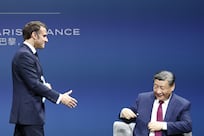What if the next United States president were to take a radically different approach to America’s place internationally? What if he condemned the invasion of Iraq and the US and European-led intervention in Libya, stated that “frankly there is no Iraq and no Libya. It’s all broken up” and declared “we can’t continue to be the world’s police”?
An American president who deliberately held back from such well-meant but ultimately disastrous attempts to remake countries in the image of the West could save hundreds of thousands of lives.
Then imagine a “leader of the free world” who also refused to continue the US tradition of reflexively supporting any Israeli administration, however recalcitrant, saying instead that he would seek a peace settlement between Israel and Palestine but would act as a “neutral guy” – a shockingly novel, but welcome, proposition.
Imagine if this same leader paid Vladimir Putin the respect he craves, built a personal rapport with him, and managed to forge a new detente with Russia. The benefits of cooperation between the two powers would be felt almost immediately in Syria, in Ukraine and in the former Soviet satellite states where military and diplomatic escalation have led to talk of a new Cold War.
Add to the equation an occupant of the White House so unencumbered by ideological baggage, and sufficiently skilled in the art of negotiating, that he helped bridge the partisan chasms in Congress and actually govern – and all in all, you would have a US president that millions would be glad to see elected, and who could make great contributions to global stability and tackling previously intractable problems at home.
There is such a candidate. The problem comes when I mention his name. For I refer, of course, to Donald Trump. Given his consistent topping of opinion polls for the Republican presidential nomination, his victories so far, and his lead in the delegate count, it is no longer sufficient to stand back, slack-jawed with astonishment, while maintaining that "it couldn't happen". For it clearly could.
“The Donald” seems set to be the Republican candidate. Combine Hillary Clinton’s many weaknesses with Mr Trump’s appeal to lower- and middle-income Americans who feel ignored and excluded by the Washington establishment, and his winning the presidency itself cannot be ruled out.
Mr Trump has said many outrageous things. From his call to ban all Muslims from entering the United States “until our country’s representatives can figure out what is going on”, to his characterisation of many Mexican immigrants as rapists, he has expanded the lexicon of what is considered sayable in mainstream politics – and not in a good way.
His refusal to condemn support from the former Ku Klux Klan leader, David Duke, when first asked (he later blamed a bad earpiece, and did disavow him), was just one of the most recent examples that suggest his campaign plumbed depths of prejudice and ignorance that would have hitherto consigned his candidacy to the margins.
But they haven’t. So it is time to take a Trump presidency seriously, to look beyond the rhetoric and ask what that would mean in practice. As Sean O’Grady put it in The Independent this week: “He is a man of extreme rhetoric and no policies. That is much more reassuring than a man with no rhetoric and extremist policies.”
His promises of success and his goals are mostly undefined, but where they are they suggest, as mentioned above, a foreign policy that might protect America and the world from foolish misadventure, reset the slavish devotion to Israel that causes the US so much harm in the world (and stands in the way of peace as well), and open the way to a new and better relationship with Russia.
His past – and some current – positions make it clear that the right-wing attack on him for not being a real conservative is quite justified. If, in fact, he has no sympathy for the Tea Party wing of the Republican party that shut down the federal government in 2013, that could only be good news. A President Trump might be far more willing to work with both Democrats and Republicans, for he prizes cutting deals and reaching achievements over maintaining the purity of an ideology that, if it exists, could be described as pragmatic populism at most.
His approach in office, says a former long-time associate, the political operative Roger Stone, would be similar to the Eisenhower model. “He will gather the finest minds, he will ask hard questions and he’ll make decisions. He doesn’t need to know the name of every sub-sect of Islamic rebels in the African continent. He just needs to know the big picture. Like Ronald Reagan.”
The Reagan analogy is interesting, for while president he was widely caricatured as a showman with such an insufficient grasp of policy that he was constantly in danger of setting off a Third World War. In recent years, however, the Gipper has consistently topped polls for being the greatest president since the Second World War, or even in US history.
He was also far less conservative than his putative heirs now like to make out. He was a pragmatic dealmaker, famously observing: “If I can get 70 or 80 per cent of what it is I’m trying to get … I’ll take that and then continue to try to get the rest in the future.”
Sound like someone we know? Mr Trump’s regrettable outbursts are bound to continue, and his election would, at least in part, represent a triumph of demagoguery over common sense and civility. But there are causes for optimism, too.
It could, just, also lead to a more sensible, less hidebound politics, with benefits for both America and the world. And that would truly be, as Mr Trump is fond of saying, “so beautiful”.
Sholto Byrnes is a senior fellow at the Institute of Strategic and International Studies, Malaysia





